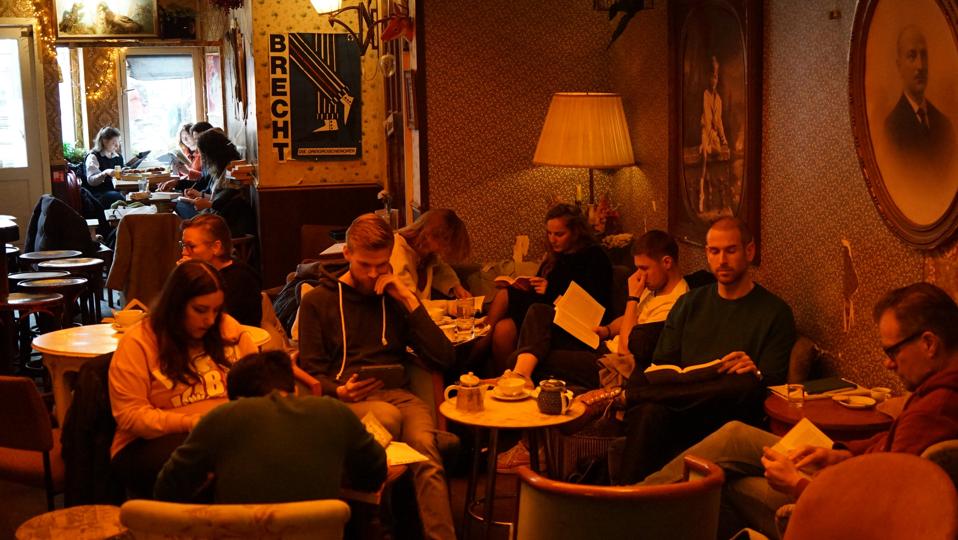The Offline Club, co-founded by Ilya Kneppelhout in Amsterdam, is a pioneering venture that provides a face-to-face refuge from the omnipresent digital world. It offers a unique environment where individuals can unplug from technology to foster genuine human connections, and I am all for it.
Its purpose statement is clear: to inspire people to swap screen time for real-time, today and tomorrow.
Rapidly evolving from a local project to a global phenomenon, The Offline Club highlights the growing societal urge to reclaim authentic interpersonal and in-person interactions. It demonstrates a significant trend toward prioritizing real-world connections over the deluge we face with our digital devices.
Origins of The Offline Club
The Offline Club was born from a personal challenge that Kneppelhout and his co-founders, Valentijn Klok and Jordy van Bennekom, faced. They grappled with digital saturation and felt that constant digital interference was eroding their time and connections.
Kneppelhout noted, “Our phones were taking too much of our valuable time, and we were not really connecting anymore with people.” This realization sparked the idea for The Offline Club, a retreat from the digital world that fosters genuine human interaction and mindfulness through face-to-face engagements in cafes and other venues throughout The Netherlands.
The founders’ personal experiment with digital disconnection—a few four-day hiatus intervals from online life—revealed significant benefits in creativity and mental peace. Inspired by this, they envisaged a community where disconnection from digital noise would allow for meaningful engagements, offering a space for individuals to savor the present, untethered from digital obligations like social media and DMs.
The Offline Club’s aim is simple: counter the pervasive influence of digital intoxication by providing an environment where face-to-face interactions are valued. This initiative will resonate with those feeling overwhelmed by digital demands, offering a haven for reconnecting with the human aspects of conversation and community.
By creating a sanctuary from our digital onslaught, The Offline Club seeks to rekindle the core human need for direct, meaningful connection and introspection, emphasizing the importance of personal interaction in an overly virtual world.
Phenomenal Growth and Appeal
Kneppelhout recounted the club’s explosive growth: “Ironically, two of our reels now have more than 15 million views, and it shows that the world is screaming for more connection and less screen time.”
The Offline Club’s journey began with small, intimate gatherings in Amsterdam, but its message quickly captured the imagination of a broader audience. Initially used as a simple tool to share events, schedules and ideas, the club’s Instagram platform became a viral sensation, propelling the concept onto the international stage. The unexpected success of their content illustrated the universal appeal of the club’s mission, attracting over 150,000 followers—eager to learn more about a digital detox experience—in less than six weeks.
Despite the convenience and connectivity offered by digital technology, there is a growing recognition of its drawbacks, including diminished face-to-face interaction and increased digital fatigue. The Offline Club is not only practical but also enjoyable, allowing individuals to rediscover the joys of in-person communication and shared experiences.
Through the first ten events, people have gathered to play games, read books, informally chat, or hammer on the keys of a piano. Even university students are attending to study without the aid of a laptop or mobile phone.
Impact and Societal Reflection
The Offline Club’s emergence intersects with a broader societal challenge: the loneliness epidemic.
As the workforce meanders through their professional lives, paradoxically feeling unseen, unheard, and disconnected, a distressing trend has surfaced where over a third of people in industrialized nations suffer from loneliness.
Before the global pandemic, the seeds of isolation had already been sown, with 76% of individuals struggling to connect with colleagues and 58% perceiving their workplace relationships as superficial. A meta-study across 113 countries substantiated the ubiquity of loneliness, underscored by the necessity of the US Surgeon General recognizing it as a critical public health issue with profound implications for physical, mental, and social well-being.
The economic repercussions of this epidemic are blunt, as loneliness saps the vitality of corporate culture and imposes hefty financial burdens on employers. For example, Cigna reported loneliness costs the US economy over $406 billion annually, a figure that hints at substantial economic impacts globally.
In this context, The Offline Club addresses not just the craving for real-world interactions but also the pressing need to mend the fabric of our social and economic systems frayed by the loneliness crisis. Kneppelhout’s reflection on this issue, “People have a need, an inner need for connection. It’s something we need as human beings,” captures the essence of the challenge and the mission of The Offline Club.
The Offline Club offers a novel sanctuary from the digital world, addressing the increasing yearning for authentic human connections in our tech-saturated society.
As the club transitions from a local initiative to a global movement, Kneppelhout’s initiative underscores the essential balance between digital engagement and the enduring value of face-to-face human interactions.
As Kneppelhout aptly pointed out, “The Offline Club is a way for people to have very easy access to that connection with themselves and others.”
Watch the full interview with Ilya Kneppelhout and Dan Pontefract on the Leadership NOW program below, or listen to it on your favorite podcast.

